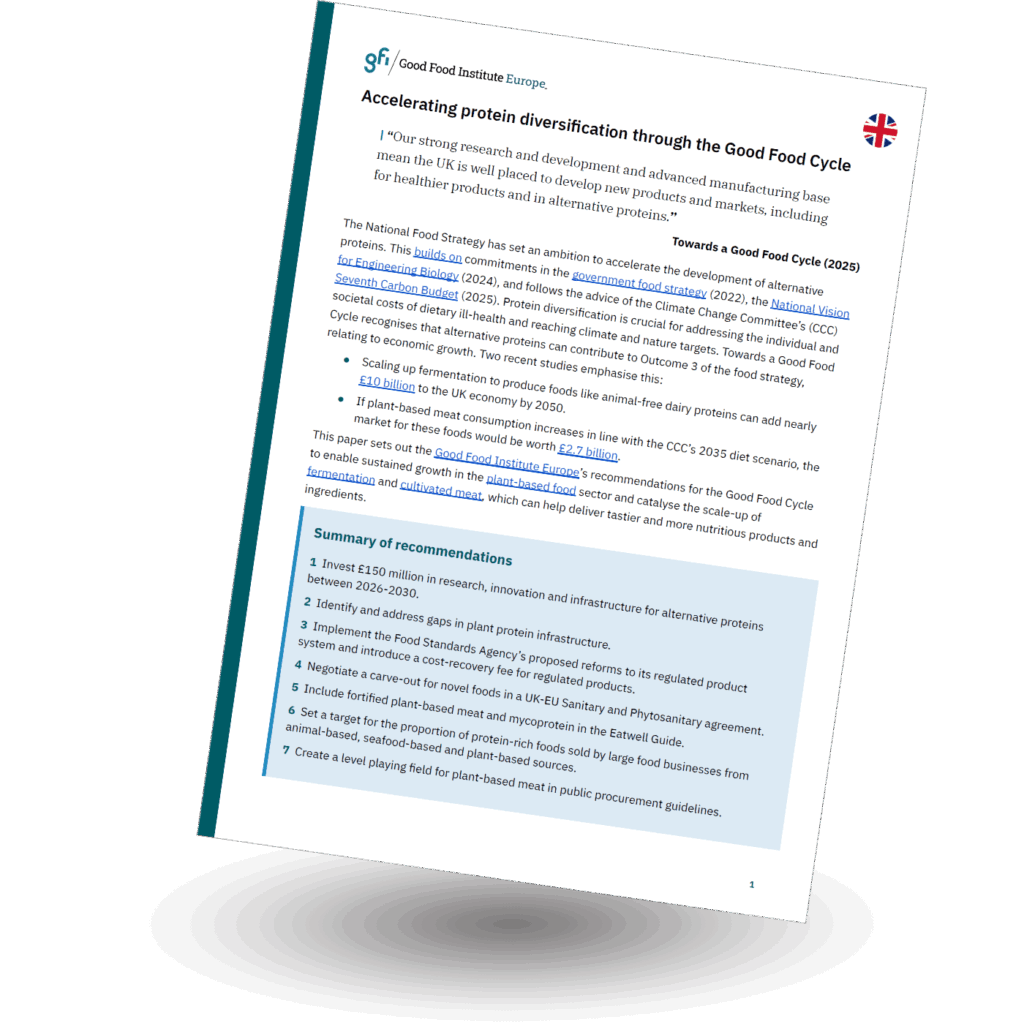Accelerating protein diversification in the UK through the Good Food Cycle
The UK Government’s new food strategy highlights alternative proteins as an economic growth opportunity that supports a more sustainable food system.

Executive summary
Protein diversification is crucial for addressing the individual and societal costs of dietary ill-health and reaching climate and nature targets. Towards a Good Food Cycle recognises that alternative proteins can contribute to Outcome 3 of the food strategy, relating to economic growth. Two recent studies emphasise this:
- Scaling up fermentation to produce foods like animal-free dairy proteins can add nearly £10 billion to the UK economy by 2050.
- If plant-based meat consumption increases in line with the CCC’s 2035 diet scenario, the market would be worth £2.7 billion.
Here we set out GFI Europe’s recommendations for the Good Food Cycle to enable sustained growth in the plant-based food sector and catalyse the scale-up of fermentation and cultivated meat, which can help deliver tastier and more nutritious products and ingredients.
Recommendations
1. Invest £150 million in research, innovation and infrastructure for alternative proteins between 2026 and 2030
Between 2020-2024, the UK invested over £100 million of public funding for research and innovation in plant-based foods, cultivated meat and fermentation. It is now Europe’s largest national funder after Denmark. The UK must build on this progress, cementing its position as a scientific leader in protein diversification, and ensuring that innovation reaches the market.
Defra and DSIT should develop a five-year commitment to invest £150 million in research, innovation, and infrastructure for alternative proteins as part of the food strategy, delivered primarily by UKRI. This would be equivalent to 3% of BBSRC and Innovate UK’s current budgets.
The new funding should be based on five complementary pillars:
£25 million in follow-on funding for UK alternative protein research centres
£30 million Plant-Based Innovation Fund
£30 million Engineering Biology Alternative Protein Innovation Fund
£35 million in university-based training, networks and open-access research
£30 million investment in food-grade alternative protein infrastructure
2. Identify and address gaps in plant protein infrastructure.
Developing strong supply chains for alternative protein inputs and ingredients is crucial to build food systems resilience and create opportunity for British agriculture. The government should leverage its convening power to identify the most pressing gaps in plant protein infrastructure across the UK. This should involve convening farmers, food businesses, researchers and investors to identify and de-risk opportunities for investment.
3. Implement the Food Standards Agency’s proposed reforms to its regulated product system and introduce a cost-recovery fee for regulated products.
In line with the Chancellor’s drive to ensure regulators promote growth and innovation, the Food Standards Agency has proposed further reforms to its regulated product system (which includes novel foods). Defra, DHSC and DSIT ministers should give clear support to the FSA to deliver the next phase of its regulatory modernisation reforms. Ideally, these should be implemented using Retained EU Law powers before they lapse in June 2026, or integrated into a Food Bill if necessary.
Reform alone cannot address the growing capacity constraints that the FSA faces in risk assessing and risk managing a wide range of food (and feed) innovations. Introducing a cost-recovery fee for applications could address this issue, mirroring the approach of other regulators including the MHRA. A public consultation should be held before any fee is introduced.
4. Negotiate a carve-out for novel foods in a UK-EU Sanitary and Phytosanitary agreement.
The UK’s progress in modernising the regulatory framework for alternative proteins has been protracted but ultimately positive. However, as the Food Standards Agency has indicated, a sanitary and phytosanitary (SPS) agreement with the EU would end the UK’s ability to authorise new food innovations, including cultivated meat and precision fermentation.
The EU has signalled that it is willing to accept some limited exemptions under a new SPS agreement and we recommend that the UK should seek a carve-out to continue authorising foods under Retained EU Regulation 2015/2283 (Novel Foods).
5. Include fortified plant-based meat and mycoprotein in the Eatwell Guide.
The Eatwell Guide should be reviewed and updated to reflect the environmental impact of
different foods and include fortified plant-based meat and mycoprotein in both visual and
text descriptions. In a challenging landscape that has led to significant misinformation about the nutritional value of plant-based foods, integrating plant-based meat into the Eatwell Guide is a practical step that the government can take to provide consumers with accurate information.
The Eatwell Guide must also consider environmental impact metrics, such as land use,
greenhouse gas emissions, and air and water pollution. It should be independently reviewed every five years, as is the case in several other countries, such as the United States. As part of a Food Bill, the government should be mandated to introduce any changes identified by this review to ensure the Eatwell Guide stays up to date.
6. Set a target for the proportion of protein-rich foods sold by large food businesses from animal-based, seafood-based and plant-based sources
A mandatory reporting metric on protein sales should be introduced for large food retail and food service businesses. UK supermarkets already report these data to WWF privately, with several publishing data publicly.
Once mandatory reporting is in place, the government should set a target for the proportion of protein-rich foods sold by large retailers and food service businesses from animal-based, seafood-based and plant-based sources for 2035 at the latest. This follows the policy logic used in other sectors, including the 2035 Zero Emissions Vehicle Mandate. The target should cover a broad range of protein-rich plant-based foods, including plant-based meat, alongside the Climate Change Committee’s advice in the Seventh Carbon Budget and high-quality nutrition and health research.
7. Create a level playing field for plant-based meat in public procurement guidelines
Each year, £5 billion is spent on procuring food in the UK. In its 2024 manifesto, the Labour Party committed to changing how this money is spent, focusing on local sourcing and higher environmental standards.
The current approach to plant-based meat in the Government Buying Standards (GBS) for food and catering is outdated. The GBS should be reviewed as part of the food strategy, embedding environmental sustainability throughout. They should highlight the nutritional value of plant-based meat, such as higher fibre and lower saturated fat levels (as is already done for conventional meat).

Read the full briefing
Explore our recommendations in more detail and learn more about the broader UK ecosystem.
